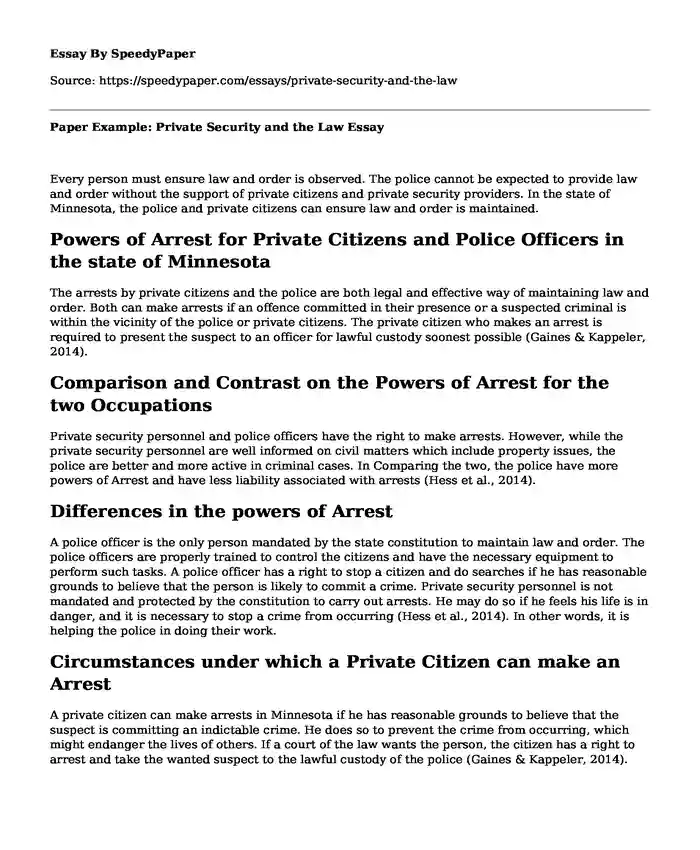
| Type of paper: | Essay |
| Categories: | Security Police Criminal justice Social responsibility |
| Pages: | 3 |
| Wordcount: | 691 words |
Every person must ensure law and order is observed. The police cannot be expected to provide law and order without the support of private citizens and private security providers. In the state of Minnesota, the police and private citizens can ensure law and order is maintained.
Powers of Arrest for Private Citizens and Police Officers in the state of Minnesota
The arrests by private citizens and the police are both legal and effective way of maintaining law and order. Both can make arrests if an offence committed in their presence or a suspected criminal is within the vicinity of the police or private citizens. The private citizen who makes an arrest is required to present the suspect to an officer for lawful custody soonest possible (Gaines & Kappeler, 2014).
Comparison and Contrast on the Powers of Arrest for the two Occupations
Private security personnel and police officers have the right to make arrests. However, while the private security personnel are well informed on civil matters which include property issues, the police are better and more active in criminal cases. In Comparing the two, the police have more powers of Arrest and have less liability associated with arrests (Hess et al., 2014).
Differences in the powers of Arrest
A police officer is the only person mandated by the state constitution to maintain law and order. The police officers are properly trained to control the citizens and have the necessary equipment to perform such tasks. A police officer has a right to stop a citizen and do searches if he has reasonable grounds to believe that the person is likely to commit a crime. Private security personnel is not mandated and protected by the constitution to carry out arrests. He may do so if he feels his life is in danger, and it is necessary to stop a crime from occurring (Hess et al., 2014). In other words, it is helping the police in doing their work.
Circumstances under which a Private Citizen can make an Arrest
A private citizen can make arrests in Minnesota if he has reasonable grounds to believe that the suspect is committing an indictable crime. He does so to prevent the crime from occurring, which might endanger the lives of others. If a court of the law wants the person, the citizen has a right to arrest and take the wanted suspect to the lawful custody of the police (Gaines & Kappeler, 2014).
Liabilities of a Private Citizen making an Arrest
Citizen arrest is an essential part of the security for everyone. However, citizen arrest comes with burdens. It is not the duty of the citizen to provide law and order. By conducting a citizen arrest, it means he is not protected by the constitution as much as the police officers are from harm (Hess et al., 2014). The citizen is not adequately trained to handle such situations. It creates a situation where the citizen exposes himself to danger knowingly, which might cause a severe injury or death in some cases. The citizen faces Legal liability. It is also possible for the citizen to get sued by the potential suspect (Hess et al., 2014).
Criteria necessary to make an Arrest
Making Arrest in the state of Minnesota has an approach that one has to follow. The officer making the Arrest must first ensure that no malice in a particular case. The officer who sees it necessary to make an arrest must give verbal notice of the Arrest to the suspect. The officer must have the authority to arrest the suspect, then go ahead and effect the Arrest (Hess et al., 2014). The officer has to ensure that there is a reason for Arrest.
Conclusion
It is the responsibility of every citizen to ensure that there is security for peaceful coexistence. Involvement of citizens helps in ensuring maximum security even without the presence of police officers nearby. The state of Minnesota has helped to ensure cooperation between police and private citizens in upholding security.
References
Gaines, L. K., & Kappeler, V. E. (2014). Policing in America. Routledge.
Hess, K. M., Orthmann, C. H., & Cho, H. L. (2014). Introduction to law enforcement and criminal justice. Nelson Education.
Cite this page
Paper Example: Private Security and the Law. (2023, Mar 27). Retrieved from https://speedypaper.net/essays/private-security-and-the-law
Request Removal
If you are the original author of this essay and no longer wish to have it published on the SpeedyPaper website, please click below to request its removal:
- Essay Example: Medical Malpractice Research
- Business Questions and Answers Example
- Essay Sample: Graduate Level Psychology Discussion Post
- Essay Example on Conceptualizations of Hegemony and Habitus
- The Victorious Youth Statute - Free Essay Example
- Access Health Care and Social Services. Essay Sample
- Free Essay Example. A Search Warrant
Popular categories




